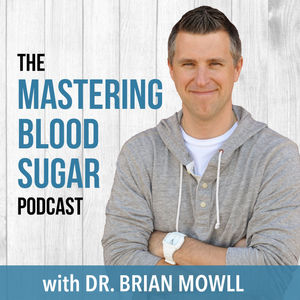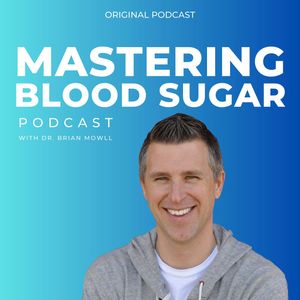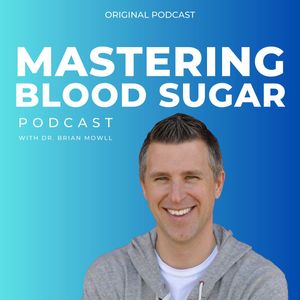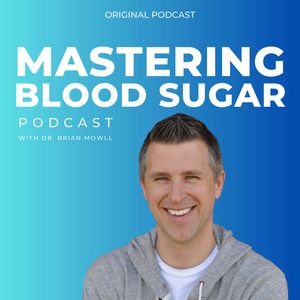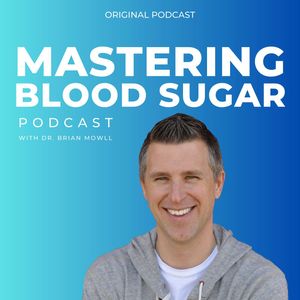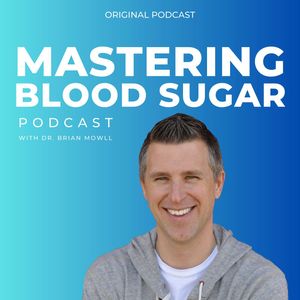Recent Episodes
In this episode, Dr. Jockers discusses the ketogenic diet, blood sugar control, and diabetes. He reflects on how the ketogenic diet's popularity has grown over the years and shares new insights and learnings from his experiences. Dr. Jockers highlights the importance of this diet in managing diabetes and improving overall health. Join us on this enlightening journey as we explore the science behind this powerful dietary approach and its myriad benefits for blood sugar regulation. This episode is your one-stop podcast for unlocking the secrets of the ketogenic diet and its incredible impact on blood sugar management.
Fueling the Body: Unraveling the Ketogenic Diet's High-Fat Magic
The ketogenic diet is a low-carb, high-fat, and moderate-protein approach that involves cutting out sugars, grains, and high-carb foods, favoring healthy fats like avocados, olive oil, and grass-fed meats. This triggers ketosis, where the body efficiently burns fat for energy, aiding weight loss. Fat's satiating effect reduces hunger, and lower carbohydrate intake leads to decreased insulin levels, promoting overall health.
Unlocking the Fat-Burning Potential: The Vital Role of Reducing Insulin Levels
The ketogenic diet reduces blood sugar levels and improves control by limiting carbs and increasing healthy fats, leading to ketosis, where the body burns fat for fuel. This lowers insulin levels, addressing insulin resistance and promoting fat utilization. Ketones, produced during ketosis, offer various health benefits.
Safeguarding Through Inflammation: The Body's Intricate Defense Mechanism Against Food Threats
Inflammation is a natural defense mechanism in the body against infection and foreign substances. Yet, chronic inflammation can be detrimental to health and increase the risk of various diseases. Dr. Jockers explains that food consumption can trigger inflammation, and adopting a ketogenic diet and fasting can help reduce it. When we eat, the body perceives food as a potential threat due to microbes and harmful substances it may contain. Consequently, the body initiates an inflammatory response to protect itself. Certain dietary choices, like high-carbohydrate foods raising insulin levels, and frequent eating throughout the day, can lead to chronic inflammation by consistently activating these inflammatory pathways. This constant presence of high insulin levels puts the body on high alert, sending inflammation signals throughout the entire system.
Key Takeaways:
00:11 Ketogenic diet improves blood sugar
10:23 Ketones and fasting reduce inflammation
10:58 Inflammation and ketosis explained
22:04 Transitioning to a ketogenic diet
22:18 Stay hydrated and consume electrolytes
32:28 Ketogenic diet can reverse diabetes
33:04 Personalized approach for optimal health
38:40 Revitalize your energy: hydrate with more water
Resources:
Website: https://drjockers.com/
Books: https://drjockers.lpages.co/keto-metabolic-breakthrough-b/
Instagram: https://www.instagram.com/drjockers/
Facebook: https://www.facebook.com/DrDavidJockers/
YouTube: https://www.youtube.com/user/djockers
Dr. Amy McKenzie discusses the work at Virta Health, an online specialty medical clinic that treats patients with type 2 diabetes, metabolic syndrome, and pre-diabetes. Virta's treatment approach includes a ketogenic diet and technology-enabled continuous remote care. By using this approach, Virta Health has been able to help patients reduce or eliminate insulin and other oral medications. Clinical trials have significantly improved patients' insulin requirements and other medication reductions. Tune in as we chat about Virta Health's game-changing new model for optimal management when it comes to diabetes.
How the Ketogenic Diet Empowers Insulin Users to Slash Dependency
The ketogenic diet has gained significant attention recently for its potential benefits in managing various health conditions, including type 2 diabetes. One organization at the forefront of utilizing this diet for diabetes management is Virta Health. Virta Health is an online specialty medical clinic focusing on patients with type 2 diabetes, metabolic syndrome, and pre-diabetes. Their treatment approach addresses the underlying principle of insulin resistance common to these conditions. The primary component of their protocol is a ketogenic diet or nutritional ketosis. This diet involves consuming ultra-low carbohydrate meals that force the body to rely on fat for energy instead of glucose.
Unleashing the Power of Lifestyle Changes to Reduce Diabetes Medication
Reducing medication for diabetes is a topic of great interest and importance in the field of healthcare. Diabetes, particularly type 2 diabetes, is a chronic condition that requires ongoing management to control blood sugar levels and prevent complications. Traditionally, medications have been a critical component of diabetes treatment, helping to lower blood sugar and manage the disease. However, there is growing evidence that reducing medication use, particularly insulin, can have significant benefits for patients with type 2 diabetes. The ketogenic diet has been shown to improve insulin sensitivity and promote weight loss. By following this diet, patients can reduce their reliance on medications, including insulin, and improve blood sugar control.
Revolutionizing Diabetes Care: Introducing a Game-Changing New Model for Optimal Management
The Virta Health program uses a ketogenic diet, which helps regulate blood sugar levels and reduces insulin dependence in type 2 diabetes. By limiting carbohydrates, the body relies on fats for energy, improving insulin sensitivity and blood sugar control. The program offers continuous remote care and physician monitoring through an app-based system. It provides ongoing support, accountability, and treatment adjustments. Peer support is also available to connect patients and foster a sense of community.
Key Takeaways:
[04:49] A ketogenic diet reduces insulin use
[07:03] Reducing medications improves diabetes management
[13:50] Importance of weight loss in diabetes reversal
[19:03] Ketones have potential health benefits
[23:06] Health coaching improves diabetes management
[27:33] Improve patient outcomes through research
[33:14] Make research evidence freely accessible
Resources:
LinkedIn: https://www.linkedin.com/in/amymckenzie5/
Virta Health: https://www.virtahealth.com/
Research: https://www.virtahealth.com/research
In this episode, CJ Walker, also known as the Genetic Diabetic, speaks about LADA (Latent Autoimmune Diabetes of Adulthood), a condition often misdiagnosed as type 2 diabetes. CJ shares her personal experience with being misdiagnosed and ultimately diagnosed with LADA and discusses the key things to know about this condition. This episode is a must-listen for anyone interested in learning more about LADA and how it differs from other types of diabetes. Listeners will gain valuable insights into this lesser-known form of diabetes and learn how to recognize the symptoms and seek appropriate care.
LADA: The Diabetes That Falls in Between
LADA, or Latent Autoimmune Diabetes of Adulthood, is a condition that is often misdiagnosed. Some people call it type 1.5 diabetes, as it shares characteristics of both type 1 and type 2 diabetes. LADA is a form of diabetes caused by an autoimmune response that attacks the insulin-producing cells in the pancreas. This results in gradually losing insulin production, leading to high blood sugar levels.
One of the key differences between type 2 diabetes and LADA is the age of onset. Type 2 diabetes typically occurs in adults over the age of 45, while LADA can occur at any age but is most commonly diagnosed in adults between the ages of 30 and 50. Additionally, LADA is more common in people who are not overweight or obese, while type 2 diabetes is often associated with obesity.
Advocating for Diabetes: A Never-Ending Fight
Diabetes is a chronic illness that requires constant advocacy; this is especially true for those with LADA, a form of diabetes that is often misdiagnosed as type 2 diabetes. CJ shares her experience of being misdiagnosed with type 2 diabetes and her frustration with ineffective treatments. It was only after advocating for herself and doing her research that CJ could receive a proper diagnosis of LADA. CJ highlights the need for individuals with diabetes to be proactive in their healthcare and not be afraid to speak up and ask questions.
LADA: The Autoimmune Diabetes That Needs Careful Management
LADA, a form of diabetes with an autoimmune origin, involves the immune system attacking healthy tissues and cells. Unlike type 1 diabetes, LADA progresses slowly and is often diagnosed in adulthood. To preserve pancreatic function and insulin production, it is important to manage LADA by minimizing stress on the pancreas. This includes avoiding processed sugars and refined flour that can trigger insulin surges. While an ultra-low-carb or keto diet isn't required, it's essential to be mindful of food choices and their impact on blood sugar levels.
Key Takeaways:
[00:21] LADA, Latent Autoimmune Diabetes of Adulthood
[04:14] Type 1.5 diabetes diagnosis
[08:27] Autoimmune conditions and proper diagnosis
[14:39] Managing diabetes takes decision-making
[16:39] Hormonal differences in diabetes
[21:09] Latent autoimmune diabetes in adults
[25:03] Managing LADA with medications
[29:14] Diabetes support and resources
Resources:
Website: https://thegeneticdiabeticblog.com/
LinkedIn: https://www.linkedin.com/in/thegeneticdiabetic/
Instagram: https://www.instagram.com/thegeneticdiabeticblog/
Facebook: https://www.facebook.com/thegeneticdiabeticblog/
We are lucky to be joined by the "Carb Addiction Doc,” Dr. Robert Cywes. Dr. Cywes works in the trenches and has a wealth of knowledge to share about preventing and managing diabetes. This episode touches on the challenges of balancing conventional and natural approaches to diabetes treatment. Plus, Dr. Cywes discusses the various ways to minimize your chances of developing diabetes and the importance of changing one's mindset to improve health outcomes. This episode is packed with valuable information for anyone looking to prevent diabetes, manage diabetes, and tackle diabetes risk factors.
Diabetes: A Growing Problem, a Growing Need for Solutions
Medication is a tool that can be used to treat a variety of medical conditions, including diabetes. However, it is essential to understand that medication alone cannot fix the root cause of the problem. In the case of diabetes, high blood sugar is just the tip of the iceberg. There is much more to be addressed to truly help those with diabetes.
Dr. Cywes emphasizes the importance of addressing behavior and treating the cause of the disease. Medication can be used as an accelerant to treatment, but it should not be relied on as the sole solution. Instead, medication should be used in conjunction with lifestyle changes and addressing the root cause of the problem. This can ultimately lead to remission of the disease and the ability to deprescribe medication.
CGMs: A Game-Changer for Diabetes Care
One crucial tool for managing diabetes is the continuous glucose monitor (CGM). CGMs provide real-time information about blood sugar levels, which is essential for effective diabetes management. Blood sugar levels should not be a flat line. Instead, blood sugar levels should fluctuate within an appropriate range for each individual. CGMs can help patients understand their blood sugar fluctuations and adjust their diet and medication as needed.
Sugar Trap: How to Avoid Insulin Resistance and Diabetes
Dr. Cywes highlights the adverse effects of excess sugar consumption on insulin resistance. The body has a delicate balance between glucagon and insulin, which work together to stabilize blood sugar levels. However, when excess carbohydrates or protein are consumed, the body prioritizes the storage of these nutrients, leading to insulin dominance instead of glucagon dominance. This can lead to insulin resistance, where the body blocks the insulin receptors to protect cells from the damaging effects of excess sugar.
Key Takeaways:
[02:31] Treating diabetes beyond blood sugar
[07:06] Blood sugar and glucagon
[11:53] Insulin and glucagon dominance
[17:36] Insulin resistance causes and theories
[21:26] Carbohydrates and fat consumption
[25:09] Medication for insulin resistance
[32:25] Insulin management in diabetes
[36:19] Insulin testing and dysregulation
[40:11] Glucagon's importance in health
[43:04] Satiety hormones and pathways
[57:10] Insulin suppression in carnivores
[01:03:06] Personalized medicine
Resources:
JSAPA: https://obesityunderstood.com
YouTube: https://www.youtube.com/channel/UCk4Mk7vArjSYBa1VKv9-chA
Instagram: https://www.instagram.com/carbaddictiondoc/
Facebook: https://www.facebook.com/carbaddictiondoc/
TikTok: https://www.tiktok.com/@carba
